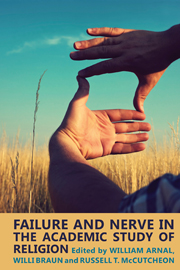The Failure of Nerve in the Academic Study of Religion
Summary
1.
My concern in this essay is with the relationship of theology to the study of religion, and, more particularly, to the academic study of religion. I shall not, however, focus attention here on such legitimate concerns that theology may have with the results of academic research on religion (e.g., Drummond 1975; Gualtieri 1972; and Wiebe 1978), or with historical or institutional questions concerning the two communities of scholars (e.g., Edsman 1974; Pannenberg 1976; Sharpe 1975, 1983; and Hebblethwaite 1980: Chapter 2), nor with the fact that, as an element of the overall configuration of religion, theology is, obviously, a focus of interest and concern to the academic student of religion (e.g., Smart 1973: Chapter 4; Werblowsky 1959, 1975). It is, rather, the methodological problems implicit in that relationship that interest me, although putting the matter this way makes barely visible the burden of my argument. Stated bluntly, it seems to me that raising the question of theology's relationship to the academic study of religion on the methodological level jeopardizes the very existence of such an academic study for it opens to debate once again who or what it is that ought to set the agenda for, and therefore to control, such a study; is it the scholar-scientist or the scholar-devotee, the church or the academy, the procedures of science or the (supposed) transcendent subject-matter of that science, etc.?
- Type
- Chapter
- Information
- Failure and Nerve in the Academic Study of Religion , pp. 6 - 32Publisher: Acumen PublishingPrint publication year: 2012

